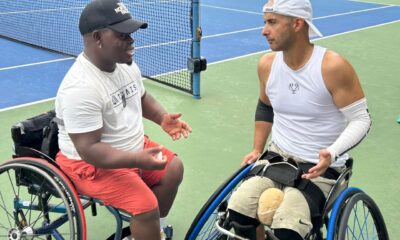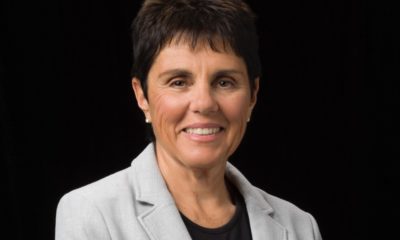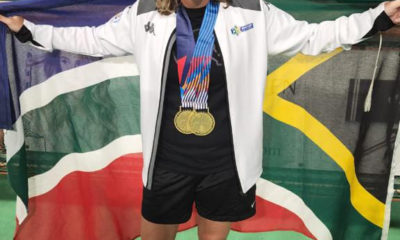
Lifestyle

To serve with love: Marlene Bethlehem pens her memoir
Published
2 years agoon
Winning the Wimbledon plate, meeting Nelson Mandela, attending the Truth and Reconciliation Commission, visiting far-flung Jewish communities, and overcoming a challenging childhood are just some of the stories that readers will discover in Marlene Bethlehem’s new book.
Titled To Serve with Love: from serving at Wimbledon to serving the community, the memoir will be launched on 3 July. This is exactly 60 years since Bethlehem (née Gerson) won the ladies’ singles All England plate at Wimbledon.
“We’ll be launching it during Wimbledon and will be serving strawberries and cream at the event,” says Bethlehem with a smile. But the book isn’t just about her time on the tennis court, it also explores her more than five decades of dedicated service to the South African Jewish community.
“If not now, then when?” says Bethlehem, about the decision to write her memoir. “I felt I had an unusual story. I played at Wimbledon four times. I’ve served the community for 55 years. Through my positions at the South African Jewish Board of Deputies (SAJBD) and other roles, I’ve interacted with interesting people. I have a chapter titled ‘The Mandela years’ – I met him often. I was with him when he toured Israel. And I was able to engage with many local communities when I was appointed to the government Commission for the Promotion and Protection of Culture, Religion, and Language. It was fantastic. I travelled all over South Africa. It was a real learning process.”
Then, it was “a huge surprise when I was elected president of the Memorial Foundation for Jewish Culture, which trains future Jewish leadership in 55 countries. If I never did anything else, training young Jewish leaders was very special. So I felt I had a story worth telling. I also wanted it for my six grandchildren, but then I thought it might be of interest to others. It’s taken three years.
“At first, my husband, Brian, helped with the editing. He’s an anaesthetist, but he also writes funny poems – he just wrote one about [Roger] Federer! My daughter, who lives in Israel, couldn’t get involved in the book, but she said one thing: I had to use the word ‘serve’ in the title.
“My other daughter, who lives in Johannesburg, offered to edit it for me. Then, Staging Post, which is part of Jacana Media, offered to print it and helped edit it. I learned a lot – for example, the difference between an autobiography and a memoir. Karen Lazar played a vital role as conceptual editor.”
Bethlehem is also celebrating her 82nd birthday on 21 June. Looking back on her early years, she says, “I had quite an unhappy childhood. My parents got divorced when I was 11, and I was sent off to a convent boarding school in Boksburg. My little brother wasn’t even seven, and he was sent off to another boarding school. At boarding school, I started playing tennis.”
She began to win tournaments and championships. “Tennis set me on my path in life,” she says. For her, it was like breathing, and she couldn’t imagine not doing it. Another defining factor of those years was a nun at the convent who became her mentor. “We stayed close throughout her life. She was even at my son’s Barmitzvah, and even though I’m Jewish, I was invited to speak at her memorial.”
Bethlehem never had an official coach, but she persisted. She also played provincial hockey. In matric, she went to the Maccabi Games, and it was there that “I knew I had to play tennis”. Two years later, she was accepted at Wimbledon. “I had always dreamed of visiting it, so to be accepted on my first try was the realisation of a dream.”
Two years later, she teamed up with an Australian tennis player whom she met at the Maccabi Games, and they became the first Jewish doubles team to reach the Wimbledon quarter finals.
Bethlehem returned to Wimbledon four years in a row. “In the last year [1962], I was playing an Australian woman and the umpire made a mistake. She called ‘new ball’ at the wrong time, and the young ball boy jumped up and his head hit me in the face. There was no such thing as asking for help then. My nose was bleeding and unsurprisingly, I lost that match.”
It took a long time for her to come to terms with what could have been if that hadn’t happened. “I just had to carry on and do my best. I couldn’t have played better than I played that week.” She was still able to enter the plate event. She won all five rounds in straight sets, including the final against Margaret Hellyer. “That match will always stand out. Sometimes I pinch myself that I was there. Also, I knew I was coming home to get engaged!”
She and Brian got married and had two daughters and a son. She was a professional coach from 1964 to 1985 and in 1974, was the official coach to the first-ever black South African women’s tennis team.
Then she discovered a new passion in community work. “My mother was very involved in the Jewish Benevolent Society (JBS). My cousin learned to sew there. My mother and I felt that we wanted to give back to it. Then, the late Gerald Leissner invited me to be part of the SAJBD. When I stood for chairperson, he ran my election campaign. All of my community work began because he heard me speaking at the JBS. He’s my communal hero.
“I was the first woman to be SAJBD chairperson in 94 years. I wasn’t the first woman able to chair. The men around me saw that women shouldn’t only be in the kitchen. I was very often in the right place at the right time. If there were opportunities, I took them. And that’s something I would like to impart to the next generation – to take opportunities to get involved in our community. Whatever time and effort you put in, you get so much in return. That’s the lesson I want to leave.”
In her four-year role as president of the Memorial Foundation for Jewish Culture, she visited Jewish communities in Moscow, Istanbul, Monte Video, and Mexico, among others. One of the highlights was being asked to speak at a Holocaust Memorial Day event in Germany. “My father’s youngest sister died in Auschwitz. My aunt knew where she was going, and managed to get her son, Jossi, to safety in France. He survived the Holocaust. Jossi’s son, Oren, is a doctor of archaeology in Israel. He was in the room when I delivered my speech along with his daughter and my two daughters. It was very meaningful, especially because my family came from Germany.”
It’s fascinating stories like this that readers will get to explore in the book, which Bethlehem feels is a read that can be enjoyed across the board – even if you aren’t a tennis fan!
Her experiences have shown her that “the South African Jewish community is so well-organised. I know because I’ve been so involved and also because I’ve seen so many other communities around the world. I have confidence in the community’s future. Thank you for giving me the opportunity to serve.”
- Marlene Bethlehem will be in conversation with Terry Shakinovsky at the launch of her book on Sunday, 3 July, at 15:30 at the Great Park Synagogue. RSVP: rchcc@gmail.com










